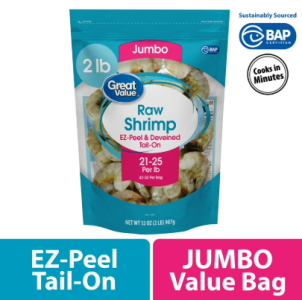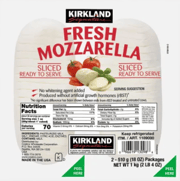Are the frozen shrimp in your freezer hiding danger? Shocking FDA warning for Walmart shoppers
- Replies 0
If you’re a fan of shrimp scampi, gumbo, or a good old-fashioned shrimp cocktail, you might want to pause before reaching into your freezer.
Officials have issued a new warning about a certain batch of frozen shrimp that was widely distributed in the United States.
The concern involves an unexpected contaminant that should never be found in the food supply.
The Food and Drug Administration (FDA) has just sounded the alarm on a batch of frozen shrimp sold at Walmart, and the reason is enough to make anyone’s antennae twitch: radioactive contamination.
Yes, you read that right. Some bags of frozen shrimp, sold under Walmart’s popular Great Value brand, have tested positive for Cesium-137—a radioactive chemical element you’d expect to find in a nuclear power plant, not your dinner plate.
Let’s break down what’s happening, what it means for your health, and what you should do if you’ve got a bag of these shrimp chilling in your freezer.

The FDA’s August 19th notice specifically calls out two-pound bags of Great Value Frozen Raw Ez Peel Tail-On Farm-Raised White Vannamei Shrimp.
These shrimp were processed by Indonesian company PT. Bahari Makmur Sejati (also known as BMS Foods). The affected lot codes and best-by dates are:
Cesium-137 (Cs-137) is a radioactive isotope created by nuclear fission. In the US, it’s used in certain medical devices and industrial gauges, but it’s definitely not something you want in your food.
While trace amounts of Cs-137 can be found in the environment due to past nuclear testing and accidents, the FDA and other agencies keep a close eye on food imports to make sure levels stay well below anything that could harm your health.
Here’s why: Prolonged exposure to Cs-137 can lead to some pretty scary health issues, including burns, acute radiation sickness, increased cancer risk, and in extreme cases, death.
The FDA’s concern is that eating contaminated shrimp over time—on top of the background radiation we’re all exposed to—could push your risk into the danger zone.
Also read: Walmart employee stunned by overnight 100% price jump on popular seafood item
The FDA detected Cs-137 in a sample of breaded shrimp from the same Indonesian supplier, which was denied entry into the US. While only one shipment has tested positive so far, the FDA isn’t taking any chances.
The entire company, PT. Bahari Makmur Sejati, is now on an import alert, meaning none of their food products can enter the US until they prove their processes are safe.
Walmart distributed the affected shrimp in 13 states:
Also read: Double recall alert: FDA flags health risks in popular seafood items
First and foremost: Do not eat the shrimp. Toss it in the trash, and don’t try to cook it, feed it to pets, or compost it.
Distributors and retailers have also been told to pull the product from shelves and dispose of it safely.
If you’re worried you may have already eaten some of the recalled shrimp, don’t panic. The risk from a single meal is likely low, but if you have concerns—especially if you eat shrimp regularly—reach out to your healthcare provider for advice.
The FDA also encourages consumers to report any adverse reactions through their Industry and Consumer Assistance portal.
Read next: Seafood lovers, beware: Over 44,000 pounds pulled in FDA recall over listeria risk

Have you ever had to toss out a favorite food because of a recall? Do you have questions about food safety, seafood, or how to read recall notices? Maybe you’re wondering how to find safe, sustainable shrimp for your next family dinner.
Officials have issued a new warning about a certain batch of frozen shrimp that was widely distributed in the United States.
The concern involves an unexpected contaminant that should never be found in the food supply.
The Food and Drug Administration (FDA) has just sounded the alarm on a batch of frozen shrimp sold at Walmart, and the reason is enough to make anyone’s antennae twitch: radioactive contamination.
Yes, you read that right. Some bags of frozen shrimp, sold under Walmart’s popular Great Value brand, have tested positive for Cesium-137—a radioactive chemical element you’d expect to find in a nuclear power plant, not your dinner plate.
Let’s break down what’s happening, what it means for your health, and what you should do if you’ve got a bag of these shrimp chilling in your freezer.

The FDA has recalled certain Great Value brand frozen shrimp for possible contamination with Cesium-137. Image source: Walmart
The FDA’s August 19th notice specifically calls out two-pound bags of Great Value Frozen Raw Ez Peel Tail-On Farm-Raised White Vannamei Shrimp.
These shrimp were processed by Indonesian company PT. Bahari Makmur Sejati (also known as BMS Foods). The affected lot codes and best-by dates are:
- Lot code: 8005540-1; Best by: 3/15/2027
- Lot code: 8005538-1; Best by: 3/15/2027
- Lot code: 8005539-1; Best by: 3/15/2027
Cesium-137 (Cs-137) is a radioactive isotope created by nuclear fission. In the US, it’s used in certain medical devices and industrial gauges, but it’s definitely not something you want in your food.
While trace amounts of Cs-137 can be found in the environment due to past nuclear testing and accidents, the FDA and other agencies keep a close eye on food imports to make sure levels stay well below anything that could harm your health.
Here’s why: Prolonged exposure to Cs-137 can lead to some pretty scary health issues, including burns, acute radiation sickness, increased cancer risk, and in extreme cases, death.
The FDA’s concern is that eating contaminated shrimp over time—on top of the background radiation we’re all exposed to—could push your risk into the danger zone.
Also read: Walmart employee stunned by overnight 100% price jump on popular seafood item
The FDA detected Cs-137 in a sample of breaded shrimp from the same Indonesian supplier, which was denied entry into the US. While only one shipment has tested positive so far, the FDA isn’t taking any chances.
The entire company, PT. Bahari Makmur Sejati, is now on an import alert, meaning none of their food products can enter the US until they prove their processes are safe.
Walmart distributed the affected shrimp in 13 states:
- Alabama
- Arkansas
- Florida
- Georgia
- Kentucky
- Louisiana
- Missouri
- Mississippi
- Ohio
- Oklahoma
- Pennsylvania
- Texas
- West Virginia
Also read: Double recall alert: FDA flags health risks in popular seafood items
First and foremost: Do not eat the shrimp. Toss it in the trash, and don’t try to cook it, feed it to pets, or compost it.
Distributors and retailers have also been told to pull the product from shelves and dispose of it safely.
If you’re worried you may have already eaten some of the recalled shrimp, don’t panic. The risk from a single meal is likely low, but if you have concerns—especially if you eat shrimp regularly—reach out to your healthcare provider for advice.
The FDA also encourages consumers to report any adverse reactions through their Industry and Consumer Assistance portal.
Read next: Seafood lovers, beware: Over 44,000 pounds pulled in FDA recall over listeria risk
Key Takeaways
- The FDA has announced a recall of certain Great Value brand frozen shrimp sold at Walmart due to possible radioactive contamination with Cesium-137, a dangerous man-made chemical element.
- The affected products are two-pound bags of Great Value Frozen Raw Ez Peel Tail-On Farm-Raised White Vannamei Shrimp, specifically those with the lot codes 8005540-1, 8005538-1, and 8005539-1, all best before March 15, 2027.
- Long-term exposure to Cesium-137 can cause serious health issues, including burns, radiation sickness, cancer, and even death, prompting the FDA to warn consumers not to eat or serve the recalled product.
- The contaminated shrimp were distributed across 13 US states, and both consumers and retailers are advised to immediately dispose of the shrimp; anyone concerned about possible exposure should contact their healthcare provider.






